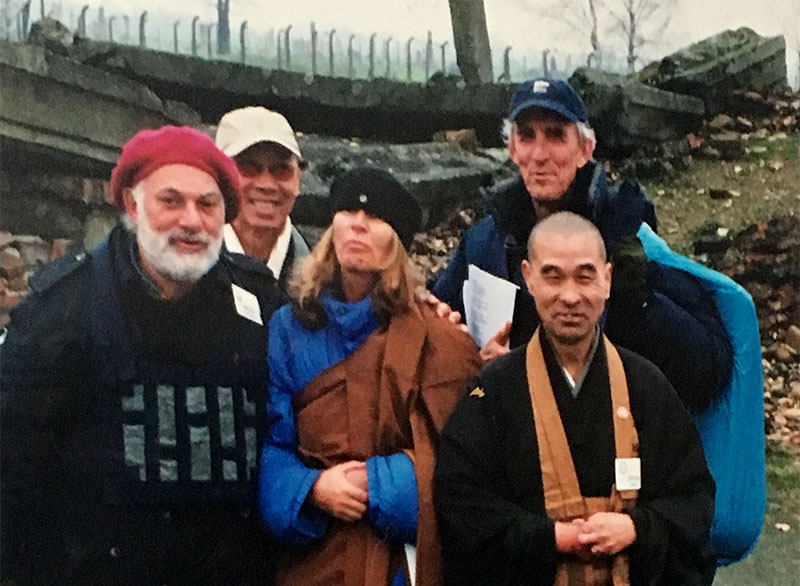This post is another in the series “Flowers on the Edges of Graves” –
reflections from 20 years of participants in the Zen Peacemakers
Auschwitz/Birkenau Bearing Witness Retreats since 1996.
How to Distinguish Day from Night
By Roshi Małgorzata Braunek (1947 – 2014)
Photos courtesy of Roshi Andrzej Krajewski. Pictured above: Bernie, Jakusho Kwong Roshi, Małgorzata Roshi, Peter Matthiessen Roshi, Junyu Kuroda Roshi at Auschwitz-Birkenau
OSWIECIM, POLAND. Bernie says that the places of pain and suffering are our greatest teachers. Therefore we went to Auschwitz – a symbol of the greatest evil that man has done to his like. Usually noticing the ubiquitous suffering around us does not mean that we are immersed in it. Rather, we train not to recognize it, because we are afraid that we can’t stand it.
The first time I traveled to Auschwitz I just asked myself if I can face the fear, apart from that I did not know what would happen here.
The most important was to understand that every thought to eliminate anything and anyone is the voice of the torturers slumbering in me. It turned out that I had such thinking as ‘eksterminujących’ (exterminate) in myself, and that there’s no end to it. For example, sweeping a container of liquid on ants, killing a mosquito or a fly. I think that is accompanied by: “Ugh, that’s awful! This must be eliminated! Dispose! Let them disappear!”; After all, this is the same way of thinking that was applied to the Jews, Gypsies, beggars, gay, to all those who were and are “different”; We see them as foreign, other, dirty (inside or outside), barbarians, worse than us – in a word, vermin disrupting our lives. They are useless, so they must be eliminated! The world would be better without them. The world knows this lesson very well … When I saw the executioner in myself for the first time, I kept crying a long while and could hardly stop again. The whole camp melted in my tears.
When I sit on the ramp or in the barracks for hours, I touch suffering directly. Sure, we are sitting there in warm jackets, we know we’ll soon have something to eat… Sure I do not know about the cold back then, I don’t wear those thin striped uniforms. But this is not about historical reconstruction. It is important to listen to what this place has to tell us. You encounter yourself and your own fear. The suffering of the people there was and is unimaginable and incomparable. They were in hell here on earth, but you have to realize that this is not a closed chapter. There’s hell within us, we go on creating it continuously …
(…)
Roshi Małgorzata Braunek (1947 – 2014) was an accomplished Polish artist and actresses and a founding teacher of the Zen Peacemaker Order in Europe. She was the wife of Roshi Andrzej Krajewski with whom she co-led the Kanzeon Zen Center and sangha in Warsaw, Poland. (fot. Piotr Kowalski)
This is an excerpt and appears in full in the book “AschePerlen – Pearls of Ash & Awe. 20 Years of Bearing Witness in Auschwitz with Bernie Glassman & Zen Peacemakers” (2015) Edited by Kathleen Battke, Ginni Stern, and Andrzej Krajewski, in German and English. Printed copies or e-book available at: https://janando.de/steinrich/en


